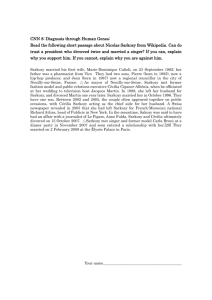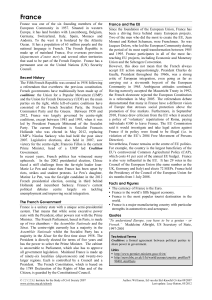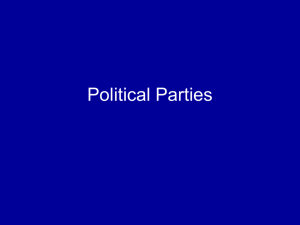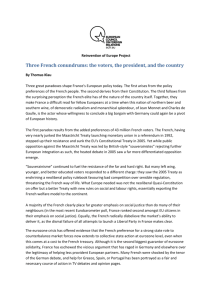221 Rue de la Loi 11-17 Rue de l'Amiral Hamelin 1040 Brussels
advertisement
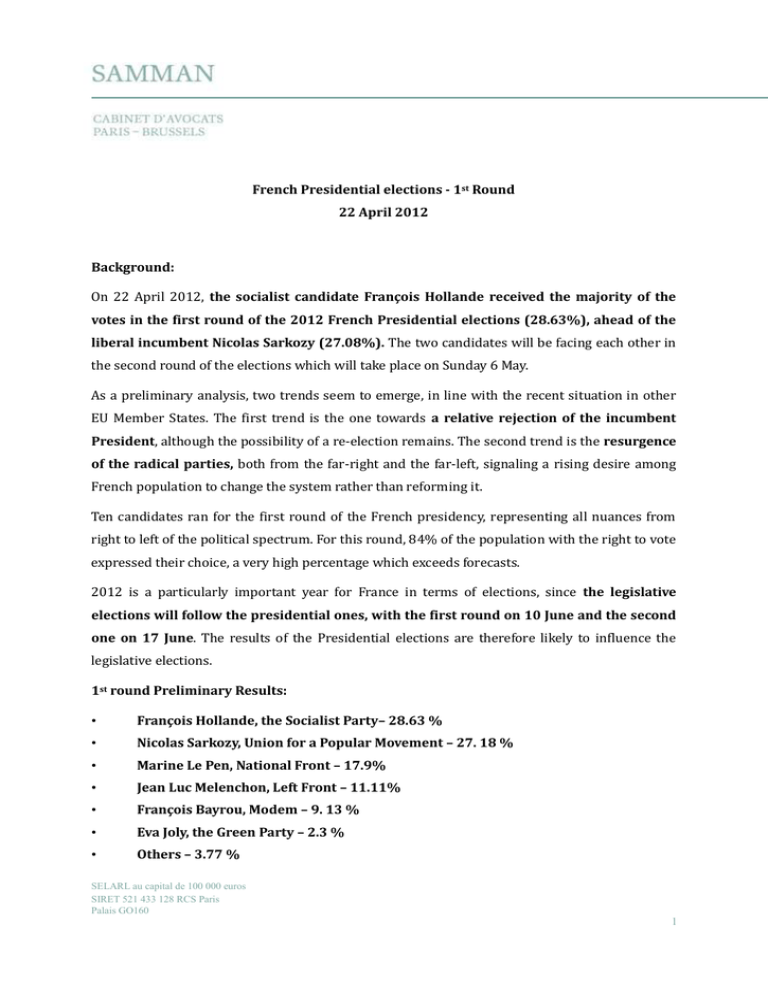
French Presidential elections - 1st Round 22 April 2012 Background: On 22 April 2012, the socialist candidate François Hollande received the majority of the votes in the first round of the 2012 French Presidential elections (28.63%), ahead of the liberal incumbent Nicolas Sarkozy (27.08%). The two candidates will be facing each other in the second round of the elections which will take place on Sunday 6 May. As a preliminary analysis, two trends seem to emerge, in line with the recent situation in other EU Member States. The first trend is the one towards a relative rejection of the incumbent President, although the possibility of a re-election remains. The second trend is the resurgence of the radical parties, both from the far-right and the far-left, signaling a rising desire among French population to change the system rather than reforming it. Ten candidates ran for the first round of the French presidency, representing all nuances from right to left of the political spectrum. For this round, 84% of the population with the right to vote expressed their choice, a very high percentage which exceeds forecasts. 2012 is a particularly important year for France in terms of elections, since the legislative elections will follow the presidential ones, with the first round on 10 June and the second one on 17 June. The results of the Presidential elections are therefore likely to influence the legislative elections. 1st round Preliminary Results: • François Hollande, the Socialist Party– 28.63 % • Nicolas Sarkozy, Union for a Popular Movement – 27. 18 % • Marine Le Pen, National Front – 17.9% • Jean Luc Melenchon, Left Front – 11.11% • François Bayrou, Modem – 9. 13 % • Eva Joly, the Green Party – 2.3 % • Others – 3.77 % SELARL au capital de 100 000 euros SIRET 521 433 128 RCS Paris Palais GO160 1 221 Rue de la Loi 1040 Brussels – Belgium O. +32 2 231 71 31 F. +32 2 231 71 39 11-17 Rue de l’Amiral Hamelin 75116 Paris - France O. +32 2 231 71 31 F. +32 2 231 71 39 Results overview: François Hollande, the candidate of the Socialist Party (PS), ranked first, gathering 28.63% of the votes. His campaign was rather soft, a conscious choice done by Socialist to counteract the flamboyant figure of his main competitor, Mr. Sarkozy. While taking a strong stance towards restarting economic growth in France, in particular by supporting job creation and the French industry, Mr. Hollande also committed to rebalancing public budget and increase taxation on very high revenues. However, the measures he has announced are not very precise therefore it is still unclear what general policies he would push forward. It is worth mentioning that he announced he would adopt financial policies which would put the finance system in line with the “real economy”, but shortly after he made a trip to London to counterbalance his statement and reassure the City. According to polls, Mr. Hollande stands a great chance to become the first Socialist President since François Mitterrand, who won a second term in 1988, and also one of the few left-wing leaders in Europe. However, due to the spread of votes among the other candidates, the result of the second round is still uncertain. Ranking second, the current President Nicolas Sarkozy, representing the right-wing party Union pour un Mouvement Populaire (UMP), collected 27.18% of votes. Mr. Sarkozy ran a campaign focused on the liberal conservative themes of strengthening borders security, reforming immigration, but also limiting public spending. Compared to the 2007 elections, when he scored 31.18% during the first round, Nicolas Sarkozy convinced a much lower number of voters. Following the first results, Mr. Sarkozy reiterated the core ideas of his campaign, taking a very patriot stance and insisting that “in this world which changes so quickly, the central question is how to preserve French people’s way of life”. Ranking third, Marine Le Pen, the candidate of the far-right party, Le Front National (FN), scored the highest percentage in the party’s history, 17.9%, even higher than in 1992 when its candidate reached the second round, and almost doubled its score of the previous presidential elections in 2007. Ms. Le Pen ran a populist campaign, iterating the classical themes of the French nationalist right (immigration, safety), this time set in the economic crisis context. Her strategy turns the French far-right movement into one of the most powerful ones in Europe, but also puts into SELARL au capital de 100 000 euros SIRET 521 433 128 RCS Paris Palais GO160 2 221 Rue de la Loi 1040 Brussels – Belgium O. +32 2 231 71 31 F. +32 2 231 71 39 11-17 Rue de l’Amiral Hamelin 75116 Paris - France O. +32 2 231 71 31 F. +32 2 231 71 39 question the future of the French right wing, as she seems to be using the conceivable defeat of the other right-wing candidate, Mr Sarkozy, to set herself as the only “legitimate” leader. The surprise candidate, Jean-Luc Melenchon, represents the far-left party Front de Gauche. He convinced 11.11% of the electors, by running a very populist campaign and holding an “antiSarkozy” and anti-capitalist discourse, usually calling for a European revolution. Soon after results were known, Mr. Melenchon called on his electors to vote against the current President in the second round, condemning the latter for having contributed to the boom of the far-right. It is worth mentioning that the centrist François Bayrou, leader of the Modem party, which used to be the third voice of the previous election, did not gather more than 9.13% of votes this time. The regression of centrists, coupled with the rising of two extremist parties, is thus a strong indicator of a denunciation of the current political system by the population. Nevertheless, it may not necessarily lead to the dismissal of the incumbent President, as the mass of supporters of the “non-winners” is quite fluid and escalates between backing the security discourse of Mr. Sarkozy or the position of Mr. Hollande towards enhancing growth through public spending. Consequences at European level The French election is closely looked at by the other EU Member States as it may be decisive with regards to the Union’s futures orientations and actions in solving the economic and financial crisis, at a time when the dominant right and centre-right governments are in favor of freezing or cutting public spending. The potential election of Mr. Hollande would temper the dominance of the center-right European People's Party in the European Council. Mr. Hollande announced that if he is elected he would reopen negotiations on the EU fiscal discipline treaty, an idea backed up by Socialists in the EU Parliament, but in opposition to the austerity policy advocated and pursued by Angela Merkel. If Nicolas Sarkozy is re-elected, he may accelerate the revamping of the European Union's borders legal framework, to please the Euro-skeptic right-wing electorate. Although so far he has agreed with the politics of austerity and the fiscal discipline tone set by Ms. Merkel, recently Mr. Sarkozy has done several statements during the final part of the campaign in favor of enhancing the role of the European Central Bank in restarting the economic growth. SELARL au capital de 100 000 euros SIRET 521 433 128 RCS Paris Palais GO160 3
